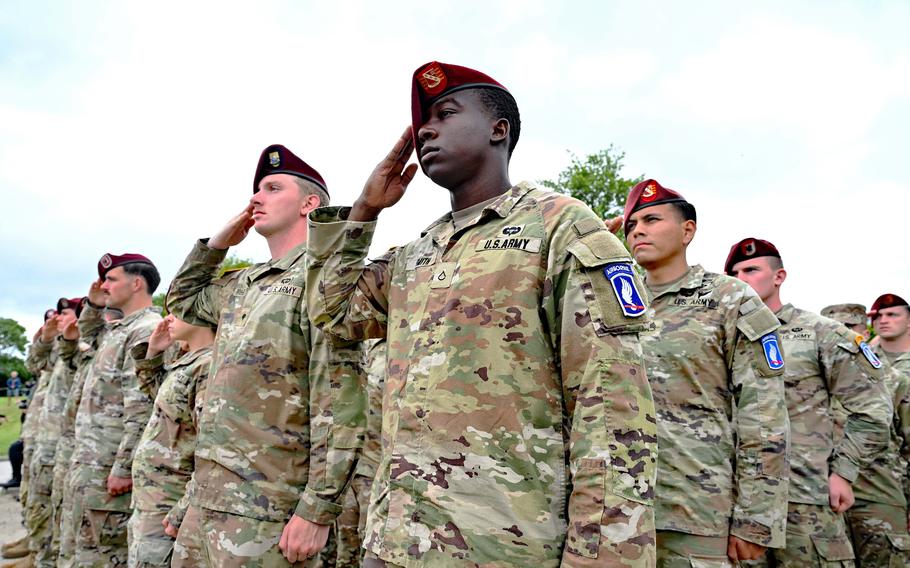
U.S. soldiers salute as the American and French national anthems are played June 5, 2025, in Sainte-Mere-Eglise, France, during a ceremony where Army Staff Sgt. William Owens was posthumously awarded the Distinguished Service Cross. (Michael Abrams/Stars and Stripes)
SAINTE-MERE-EGLISE, France — Army Staff Sgt. William Owens was posthumously awarded the Distinguished Service Cross at a ceremony Thursday for extraordinary heroism displayed during the Allied invasion of Normandy more than eight decades ago.
The Army presented its second-highest military decoration to Owens’ family at La Fiere Bridge, the site of one of the most intense and critical battles fought by the 82nd Airborne Division on D-Day.
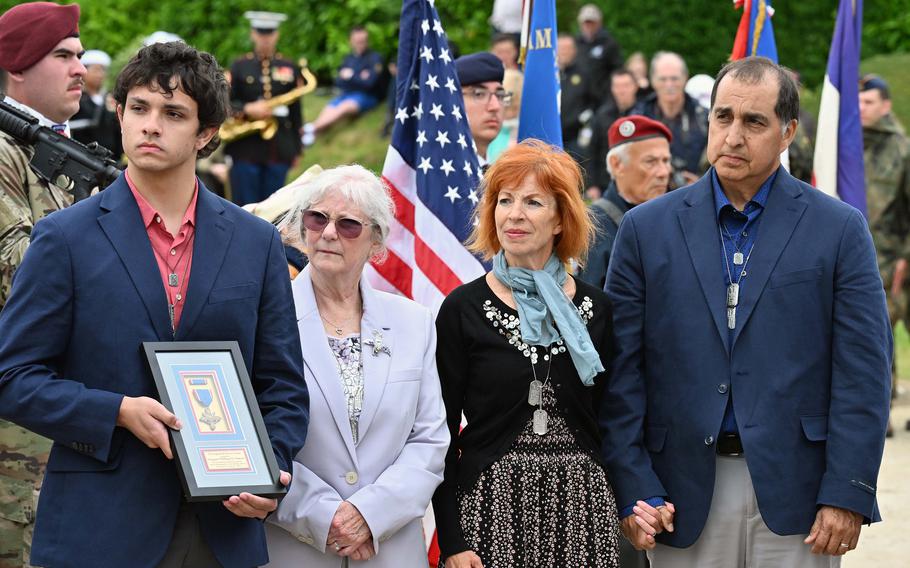
Relatives of Army Staff Sgt. William Owens, from left, great-grandson Harrison Morales, daughter Susan Marrow and Morales’ parents, Jennifer Naimo Morales and Tim Morales, listen at a ceremony in Sainte-Mere-Eglise, France, on June 5, 2025. Owens, a veteran of D-Day, was posthumously awarded the Distinguished Service Cross at the ceremony. (Michael Abrams/Stars and Stripes)
The ceremony came a day before the 81st anniversary of the invasion, which was crucial to the Allied victory over Nazi Germany.
“On that fateful day, at that fateful time, when the nation and other nations needed this position to hold — if it did not hold, the fate of D-Day would have been tremendously different — at that time he stepped up,” U.S. Army Europe and Africa commander Gen. Christopher Donahue said at the ceremony.
Owens, a paratrooper with the 82nd Airborne Division’s 505th Parachute Infantry Regiment, descended into a drop zone just west of Sainte-Mere-Eglise in the early hours of June 6, 1944.
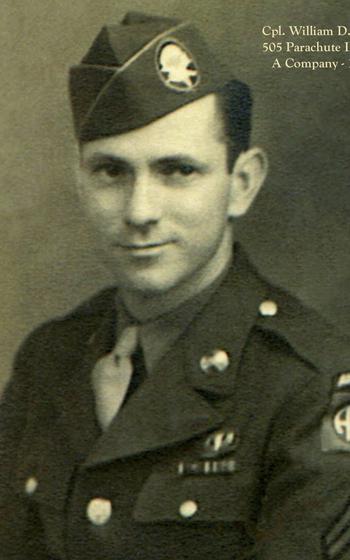
Army Staff Sgt. William Owens, who fought in the D-Day invasion in World War II, was posthumously awarded the Distinguished Service Cross on June 5, 2025, at a ceremony in Sainte-Mere-Eglise, France. Owens died in 1967. (Michael Abrams/Stars and Stripes)
His unit was tasked with securing La Fiere Bridge, which spanned the Merderet River and was vital to blocking German reinforcements from reaching Utah Beach, clearing the way for American troops to advance inland.
Utah Beach was one of two beaches where American troops landed by sea on D-Day, the other being Omaha.
Serving as a squad leader of 1st platoon, Company A, Owens helped establish a defensive position at the site on D-Day.
The soldiers at the site suffered high casualties under relentless enemy fire and infantry assaults. Owens continuously adjusted defensive lines and resupplied ammunition while managing three machine guns and two vital bazooka teams overwatching the bridge.
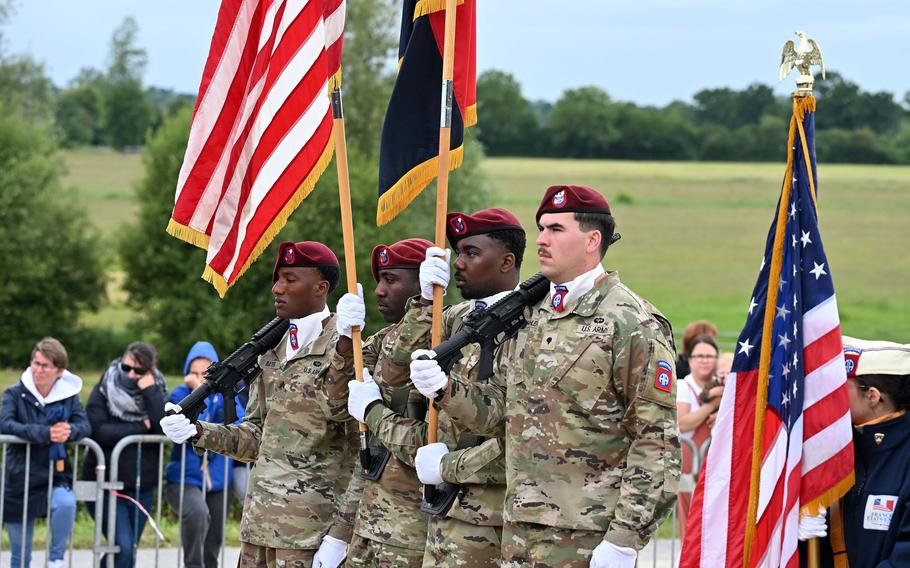
The U.S. Army color guard at a ceremony June 5, 2025, in Sainte-Mere-Eglise, France. World War II-era soldier Staff Sgt. William Owens was posthumously awarded the Distinguished Service Cross for his actions defending a causeway on the outskirts of Sainte-Mere-Eglise on and after June 6, 1944. (Michael Abrams/Stars and Stripes)
Among the dead was his company’s commander. Owens stepped into the role after the death.
At that time, he had few men left and received the order to hold the position at all costs. He’s said to have calmed the troops while continuing to man three machine guns.
The Germans eventually asked Owens for a truce. Because of his actions, four tanks were destroyed, more than 275 Germans were killed and La Fiere Bridge was held.
“We shouldn’t allow today’s optimism or today’s relative calm, the beauty of this setting to deceive us,” 82nd Airborne Division commander Maj. Gen. Pat Work said at Thursday’s ceremony. “This was once the most dangerous place on the planet.”
Work referred to Owens as “a sergeant who probably saved the battered 1st of the 505th Infantry from total annihilation.”
Owens becomes the 18th recipient of the Distinguished Service Cross for actions at La Fiere Bridge.
Besides Normandy, Owens participated in the invasion of Sicily and the landings at Salerno in Italy, before he arrived in France. After Normandy, he took part in Operation Market Garden in the Netherlands.
An Iowa native who lived in California after the war, he died unexpectedly in 1967 at the age of 54.
Owens’ youngest daughter, Susan Marrow, who was 11 when her father died, knew he had a scar on his leg from the war but didn’t know much else about his heroics in battle until officials advocating for his award upgrade contacted her in recent years.
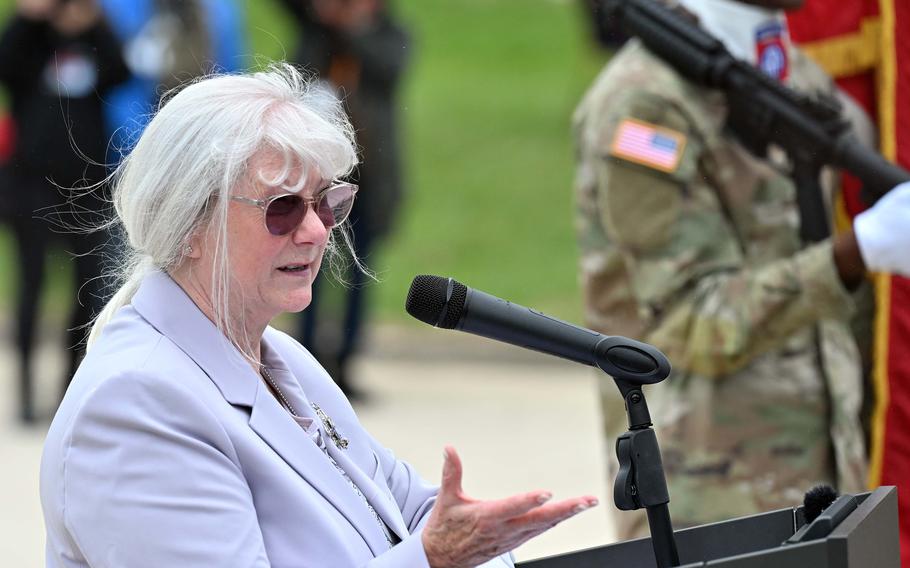
Susan Marrow, the daughter of Army Staff Sgt. William Owens, speaks at the June 5, 2025, ceremony where her father was posthumously awarded the Distinguished Service Cross for his World War II actions on D-Day and the days following. (Michael Abrams/Stars and Stripes)
“I see him totally differently now,” Marrow said. “I really wished he had lived so I’d get to know the man as an adult rather than a child.”
Harrison Morales, Owens’ great-grandson, only learned about Owens when he was contacted by the same officials, who told him he had the blood of an American war hero in his veins.
Morales was adopted but speaks with his biological grandmother Kay Hutchengs, Owens’ first daughter from his first marriage. She couldn’t make the ceremony because of poor health, so Morales spoke in her place.
“Everything he did he did for somebody else,” Morales told the crowd, relaying his grandmother’s description.
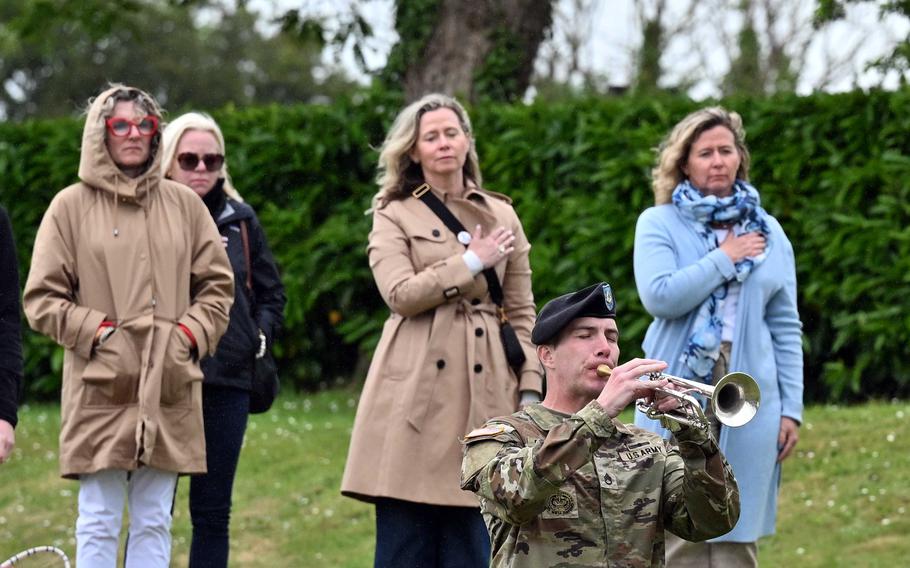
Staff Sgt. Bradley Sherman of the 4th Infantry Division band from Fort Carson, Colo., plays taps June 5, 2025, at the end of a ceremony in Sainte-Mere-Eglise, France. The ceremony was held to posthumously award the Distinguished Service Cross to Staff Sgt. William Owens for his World War II heroism there on D-Day and the days afterward. Owens died in 1967. (Michael Abrams/Stars and Stripes)
Owens had already been awarded the Broze Star for his efforts at La Fiere Bridge. Last spring, Congress approved the upgrade.
He also is a recipient of the Silver Star, the third-highest military combat decoration, for other services during World War II.
Thursday’s ceremony was one many events held in Normandy ahead of the 81st anniversary of D-Day on Friday. It will be marked by a ceremony at the Normandy American Cemetery, where nearly 9,400 American World War II dead are buried.
Defense Secretary Pete Hegseth is scheduled to speak at the event and attend an international ceremony on Utah Beach afterward.